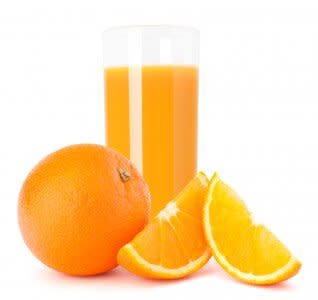Should Kids Say No to Juice?

Do you give your kids juice but worry that doing so will increase their risk for obesity or type 2 diabetes or nutritionally wreck their diets? Although 100% juice, a source of sugar (though it's naturally occurring), has been maligned in the media and by many experts—even though it's free of "added sugars" that should be limited in any child's diet—there's evidence that incorporating small amounts may offer perks without the peril when it comes to kids' health and overall nutrient intake.
In a recent study published in Childhood Obesity, researchers looked at the link between intake of beverages (including 100% fruit and vegetable juice) in early childhood and change in body fat levels from preschool to adolescence. Dietary intake using multiple sets of 3-day food records was assessed for 12 years and body mass index, waist circumference and skinfold measurements were also assessed yearly in 103 non-Hispanic white boys and girls. Researchers found that those who consumed the most fruit and vegetable juice when they were young seemed to be better protected against the development of excess body fat during adolescence than those who consumed the least fruit and vegetable juice.
Although we need more data—especially as it relates to children—a recent review in PloS One that included an analysis of four studies done in adults concluded that intake of 100% fruit juice was not associated with risk of developing type 2 diabetes.
In another study, researchers looked at usual reported intakes of 100% fruit juice among 2- to 18-year-olds. They found that compared with 100% fruit juice consumers, a significantly higher percentage of non-consumers had intakes below recommendations for several key nutrients including vitamin A, vitamin C, folate, phosphorus and magnesium. In addition, a greater percentage of 100% fruit juice consumers exceeded recommended intakes for potassium—a nutrient that many children fall short on—compared with non-consumers. The researchers concluded that consuming 100% fruit juice is associated with improved nutrient adequacy and can contribute to a healthy diet in children and adolescents.
As a registered dietitian nutritionist and mother of two, I do keep some 100% fruit juice in my home. Although my sons, aged 15 and 11, drink it, they don't have it every day. To help my own kids meet their daily fruit quotas (about 1.5 cups for my younger son, and 2 cups for my older son), I keep plenty of fresh, whole fruit around and always offer that first. That's because whole fruit offers fiber and, calorie for calorie, usually packs in a lot more nutrients than an equivalent amount of juice. But when I do offer juice (I only buy 100% fruit juice that has no added sugars), I offer no more than a 6-ounce box or 8-ounce cup of juice (usually orange or apple juice)—amounts that are consistent with the American Academy of Pediatrics' recommendations (up to 4 to 6 ounces for 1- to 6-year-olds; and up to 8 to 12 ounces for 7- to 18-year-olds). I also offer it with a meal or hearty snack rather than in-between when the temptation to OD is too great.
While my younger son isn't much of a juice drinker (he only likes mild-tasting fruits, and won't touch candy or chocolate—which sometimes makes me question if he really is my child), my older son has more of a sweet tooth and has been known to down not one but two cups of cranberry juice when we go out to a restaurant once every week or so. Because my kids are each at a healthy body weight and because I know their usual juice intake is moderate, I don't worry that drinking it will sabotage their diet. I do, however, think it's wise for all parents—especially those whose kids are overweight or obese—to think twice about their kids' juice intake in the context of their overall diet. Although we need more data, some studies suggest that increased intake of 100% juice is linked with higher body weight in children and adolescents who are overweight or obese. With that in mind, current Dietary Guidelines for Americans suggest that most fruit recommended should come from whole fruits (including fresh, canned, frozen and dried forms) rather than from juice, and that when juice is consumed it should be 100% juice rather than juices made with added sugars. I concur!
What's your take on 100% juices in your kids' diets? Yay or nay?
Image of juice glass and orange fruit via shutterstock.
